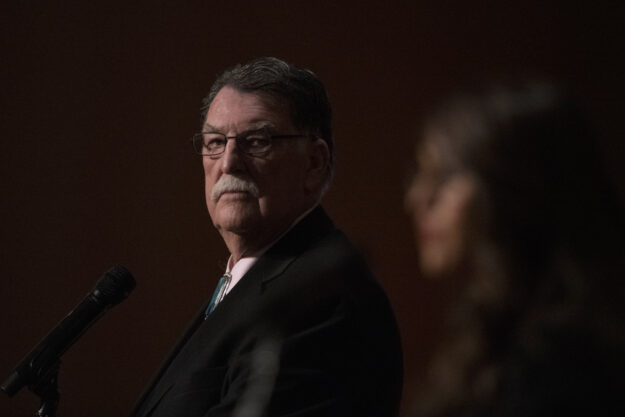Widgetized Section
Go to Admin » Appearance » Widgets » and move Gabfire Widget: Social into that MastheadOverlay zone
Coram looks to paint himself as moderate, bipartisan antidote to political instigator Boebert in debate

State Sen. Don Coram tried to paint himself as a moderate, experienced alternative to incumbent U.S. Rep. Lauren Boebert during the first debate between the candidates ahead of the Republican primary elections.
“As George Washington said in his farewell address, our biggest threat to our young republic is excessive partisanship. We have a nation that is so divided that they couldn’t agree on buying ice cream, and that needs to change,” Coram said during a debate Thursday morning at the Sky Ute Casino Resort in Ignacio. “I have been critical of the opponent’s record and I’d liken it to a new Denver football player, in that she throws a lot of passes but has zero completions. Who would be happy with that?”
Boebert leaned into the ideological differences between her and Coram, who has a history of bipartisanship during his time in the Colorado General Assembly.
“I ran as a conservative and I won as a conservative. I legislate as a conservative because I am one,” she said during her opening statement. “I will win this primary because I am the only conservative in this race.”
She called it a “bipartisan” debate, though they are both Republicans.
The split was obvious elsewhere: The approximately 300 attendees clearly separated themselves based on candidate preference, with one side of the event space pro-Coram and the other pro-Boebert.
The debate was the first in-person encounter between the two candidates in one of the state’s most anticipated primaries in Colorado’s 3rd Congressional District. It was moderated by Dave Woodruff, the Durango chapter president of the Colorado Restaurant Association. Candidates had two minutes to respond to pre-written questions, and then had the opportunity to ask one another questions at the end.
Marina Zimmerman, who did not make it on the Republican primary ballot but is running as a write-in candidate for the general election, did not participate.
Boebert was first elected in 2020 after defeating longtime Rep. Scott Tipton. Coram, of Montrose, was first elected to the state House of Representatives in 2010 and the state Senate in 2018.
Though Coram’s campaign claimed that the candidates agreed on a “paper and pencil” policy — meaning they could have paper on stage to take realtime notes but could not bring prepared information — Boebert had pre-written notes she referenced frequently throughout the debate.
“She shows up with a notebook of answers already, and I’m up there with not even a piece of paper. I thought that was a bit disingenuous, but I also realize that’s her only operative, because she can’t think on her feet,” Coram told reporters afterwards.
Gun policy in the wake of Uvalde
The first question revolved around this week’s mass shooting in Uvalde, Texas, where a gunman murdered 19 elementary school children and two teachers. The candidates were asked what role Congress has in reducing mass shootings and what reforms, if any, they would support.
Coram responded that he wants to prioritize mental health support, a common Republican response to gun reform questions.
“Republicans and Democrats, for years, have talked about mental health. Mental health is the cause of a lot of the problems that we have in these shootings. But we have not put the commitment together to fund the necessary treatment and address those issues,” he said.
The Uvalde shooter had no known history of mental health problems, Texas Gov. Greg Abbott said Wednesday.
Boebert, who is a vocal supporter of gun rights and owns a firearm-themed restaurant, said that additional laws won’t fix the problem, as criminals will just disregard them.
“We cannot legislate away evil,” she said. “We need to be able to arm and protect ourselves. Moms need to be able to have a tool — an equalizer — to protect their children. Our teachers need to be well equipped and trained and certified to also protect our children.”
She said she wants the state to use excess federal ARPA funds to “secure” schools, which would include increasing police presence on campus.
Boebert proud of Jan. 6 vote to block 2020 election
Boebert used a question on election integrity to spread baseless claims of voter fraud in the 2020 presidential election. She pointed to debunked anecdotes of “hundreds of thousands of ballots” going out illegally and the presence of “illegal drop boxes.” Claims of election fraud have been repeatedly debunked by experts, courts and election officials from both parties.
Boebert voted to overturn the 2020 presidential election results.
“I am proud that the first major action that I took in the House of Representatives was to vote to not certify some of the electoral college results from the 2020 elections,” she said.
She said she opposes any federal election legislation.
“We do not need a D.C.-takeover of any of our elections,” she said. “That should go to the states.”
Coram agreed that elections are local and state issues but said he has yet to see any evidence of fraud in the 2020 election.
“I’m not denying that it may be there, but I want to see it in a court of law. I look forward to 2022 and 2024, rather than a theory that might have happened in 2020,” he said.
Immigration reform
Boebert said one of the “greatest experiences” she has as a representative is attending citizenship ceremonies with people who “did it the right way.” She reiterated her common talking point that “every state is a border state,” including Colorado.
She also attacked Coram’s 2021 vote in favor of creating the Colorado Office of New Americans, which is intended to be the point of contact for immigration issues in the state.
“My opponent voted yes for that Department of Illegal Immigration,” she said.
Coram defended that vote, saying it is important for the state to know the number of immigrants, documented or otherwise.
“I’m not in favor of illegal immigration, either,” he said. “But they are here, and we have a responsibility — you, the citizens of Colorado. Their children can go to school. They are entitled to medical care. They are human beings who deserve representation and the love of God.”
His response was met by boos from Boebert’s supporters.
Coram said he would also support a system that allows non-resident workers to come to the United States to work, such as a “red card” program that gives permits for employment without the promise of citizenship or residency.
Wildfires, water, natural resources
Both Boebert and Coram agreed that Colorado’s forests need to be managed better to prevent wildfires and that it should start locally.
“The people on the ground are great,” Coram said. “But the bureaucrats in Washington, D.C., have no idea what the forests in Colorado look like, the health conditions of it. We have allowed the U.S. Forest Service for years and years to be totally mismanaged.” He said he is in favor of mechanical thinning and well-planned prescribed burns.

He said the government should enable innovation and technology to help predict and fight wildfires. And he connected wildfire mitigation with water issues.
“We are in a water crisis right now. I think it’s important we have someone who actually has a background of water knowledge and issues. That is what I’ll bring to the United States Congress,” he said.
To underline his understanding of water issues, he pointedly asked Boebert her thoughts on the public trust of water, a technical doctrine that has to do with water rights. Boebert said she would have to “look into it.”
Boebert touted legislation she introduced last year aimed at wildfire mitigation that would fund the removal of trees killed by bark beetles among other prevention programs. She described it as the most comprehensive forestry bill in decades.
She criticized the U.S. Forest Service’s decision to pause prescribed burns in the midst of expanding drought conditions to review protocol and decision-making processes.
“This decision will only result in more catastrophic wildfires this summer and more fuel will stay on the ground. I called them out for putting bureaucratic politics ahead of the people of Colorado. It’s not an actual solution,” she said.
Boebert mainly used the cross examination portion of the debate to claim Coram has used his elected office for personal gain — allegations Coram has denied — while Coram accused Boebert of “grandstanding.”
By the end, audience decorum had dwindled and the candidates used their closing remarks to further emphasize their differences in policy-making ideology.
“I would say that today has proven in this bipartisan debate that the contrast could not be bigger than Don Coram and me,” Boebert said.
Coram said that Boebert’s goal is to become a political celebrity.
“I’m just a legislator. I’m not an instigator. I’m not looking for a reality TV show. I’m looking to do a job,” he said. “I’m here to work. I’m a workhorse. I’m not a show horse, and I will do the job. I’ve proven that for 12 years.”
He also challenged Boebert to present concrete evidence of any corruption from his time in office.
To Coram, his success in the primary will be up to unaffiliated voters, who make up about 42% of the voters in the district. Some attendees on Thursday said they had switched their affiliation from Democrat to unaffiliated in order to vote for Coram in the primary. In Colorado, unaffiliated voters can vote in one party’s primary election. Whoever wins the Republican primary will have an advantage over the Democratic candidate in this district, which leans Republican by about 9 percentage points.
“The race is the unaffiliated,” he said. “There’s Democrats who are frustrated with their party. There’s Republicans who are frustrated with theirs, and they are migrating to the new majority.”
A second debate is in the planning stages and will likely be held in Pueblo. A virtual forum with both Democratic and Republican candidates in the district will be held on June 8. Primary elections are June 28.
Editor’s note: This story first appeared on Colorado Newsline, which is part of States Newsroom, a network of news bureaus supported by grants and a coalition of donors as a 501c(3) public charity. Colorado Newsline maintains editorial independence. Contact Editor Quentin Young for questions: info@coloradonewsline.com. Follow Colorado Newsline on Facebook and Twitter.
Sara Wilson
Latest posts by Sara Wilson (see all)
- Insurers seek nearly 40% increase in premiums on Western Slope as state blames federal policies - July 18, 2025
- Immigrant rights groups push Colorado AG Weiser for probes into violations of ICE collaboration law - July 11, 2025
- Hurd, Boebert, Evans, Crank all vote to extend tax breaks, beef up ICE while slashing Medicaid - July 3, 2025


